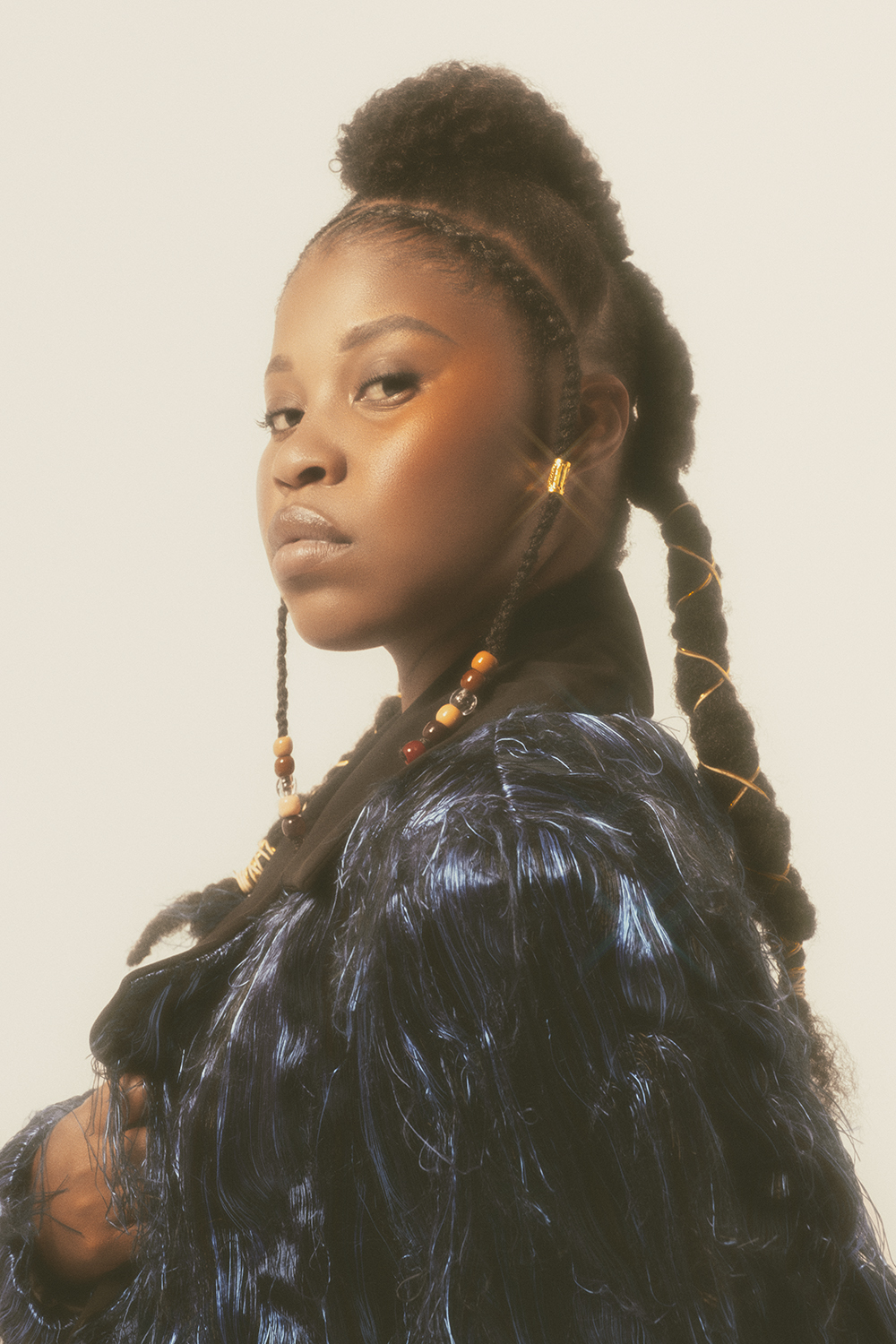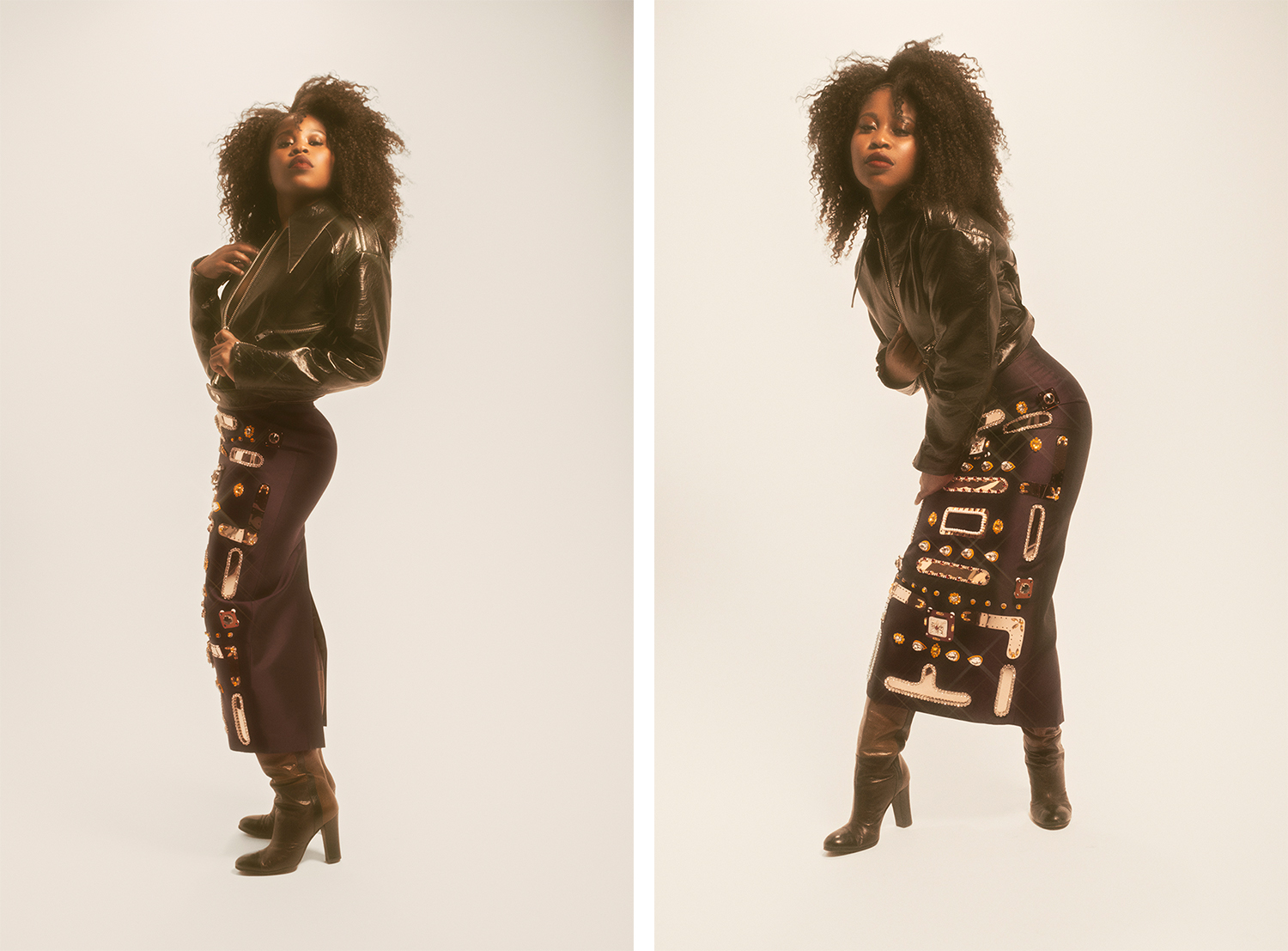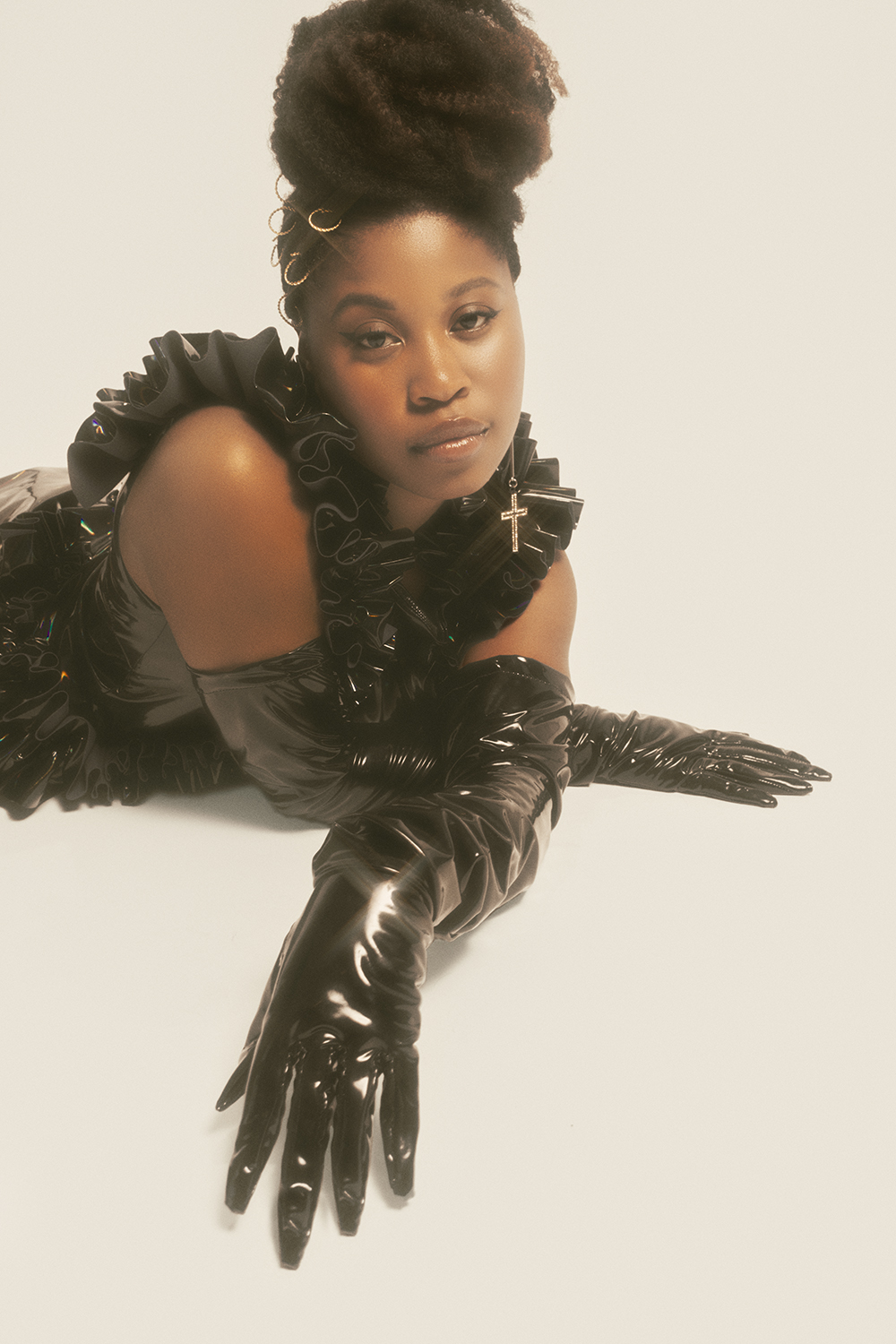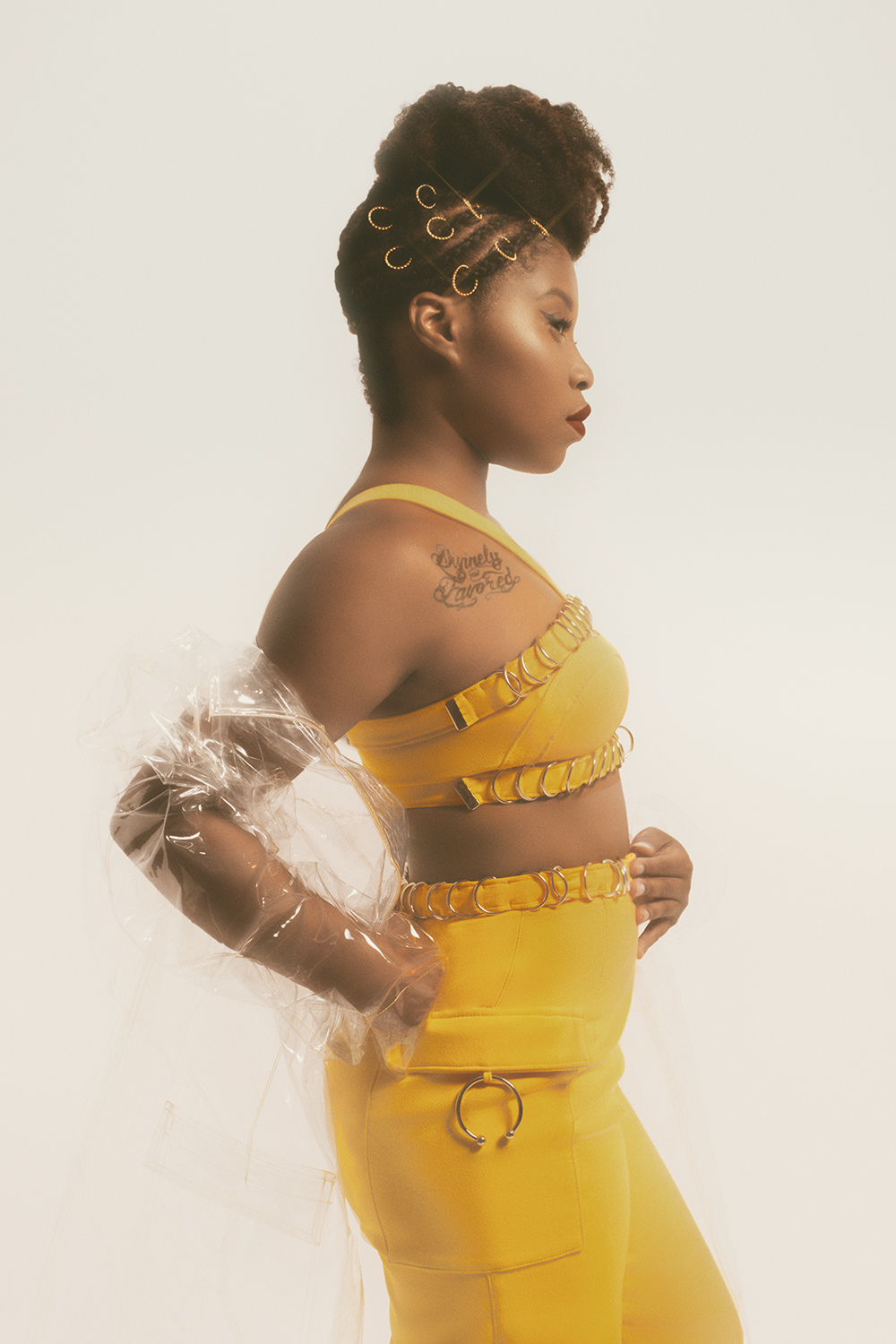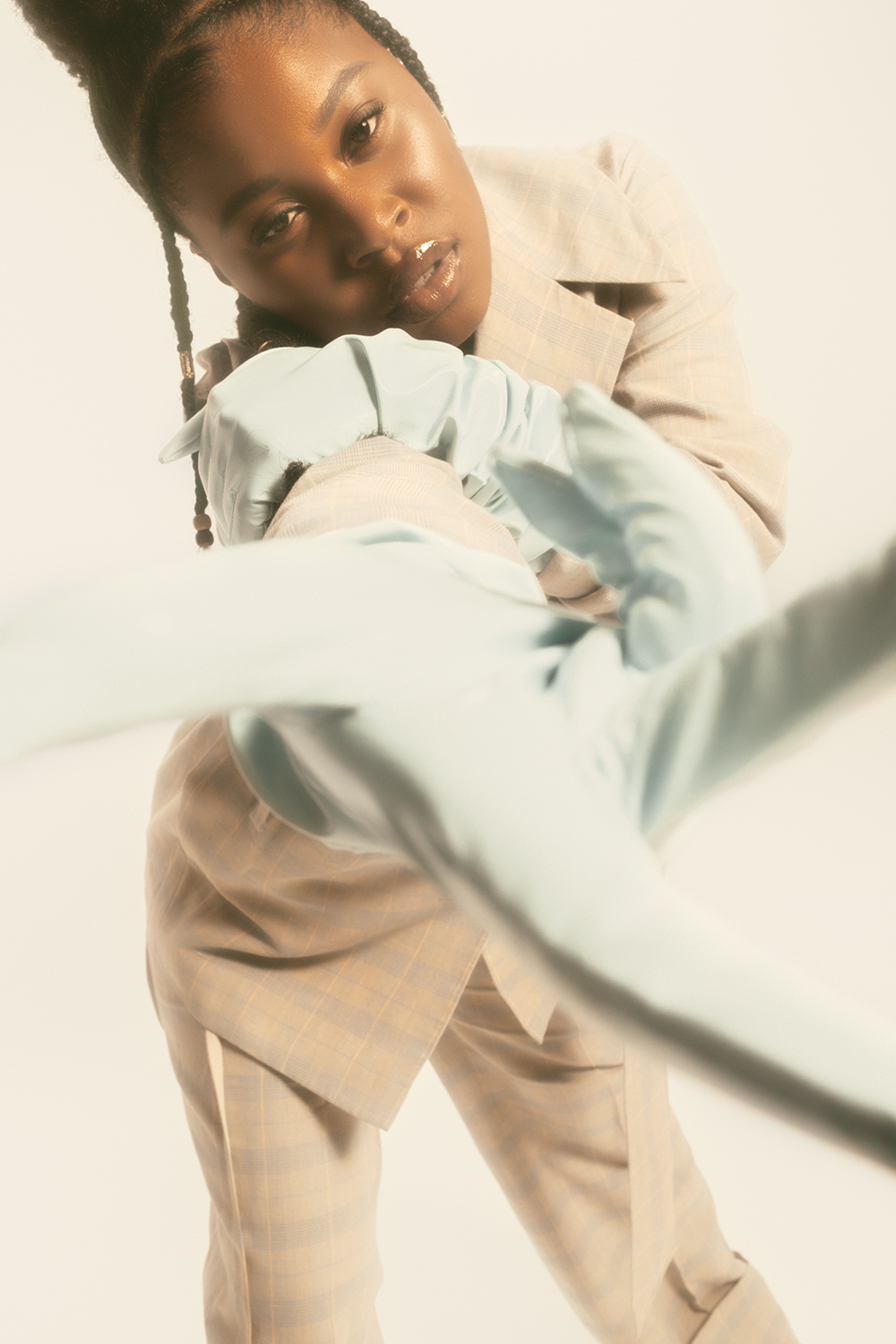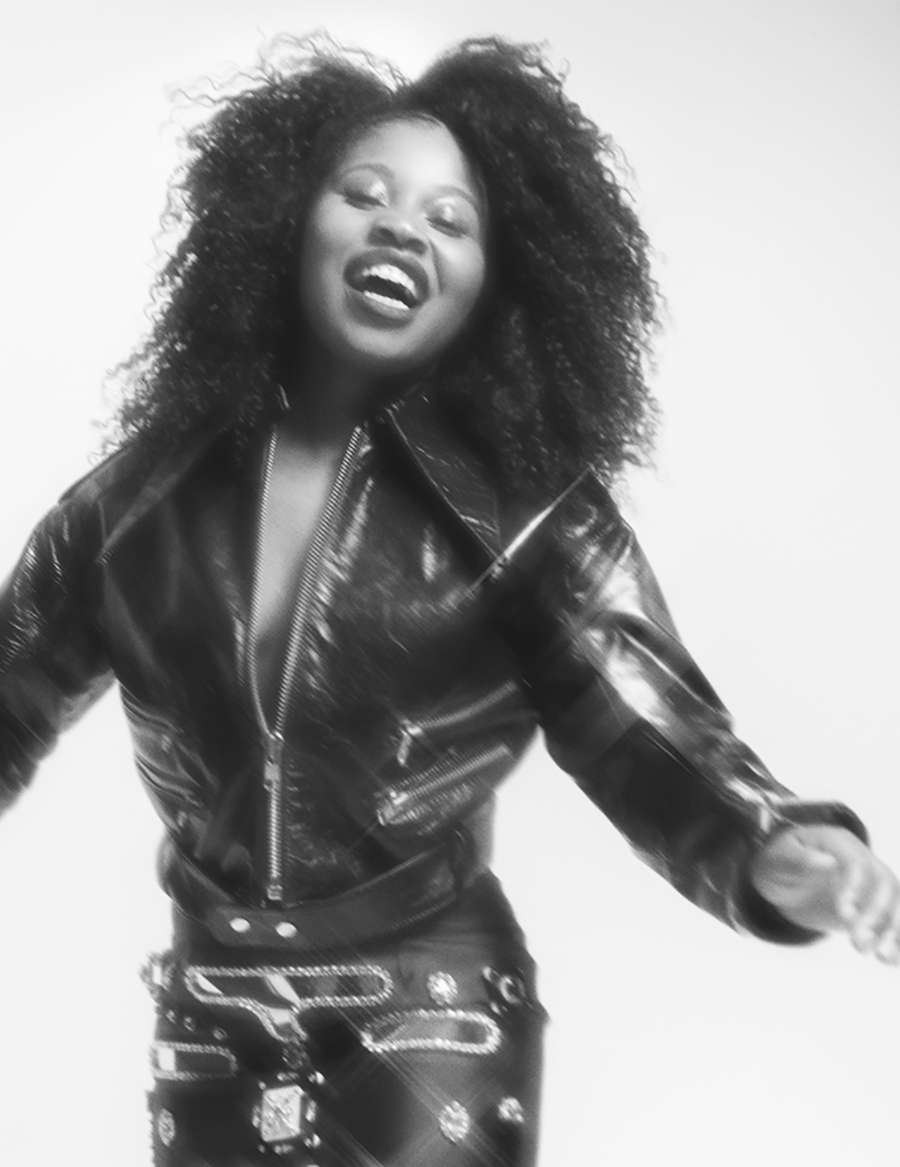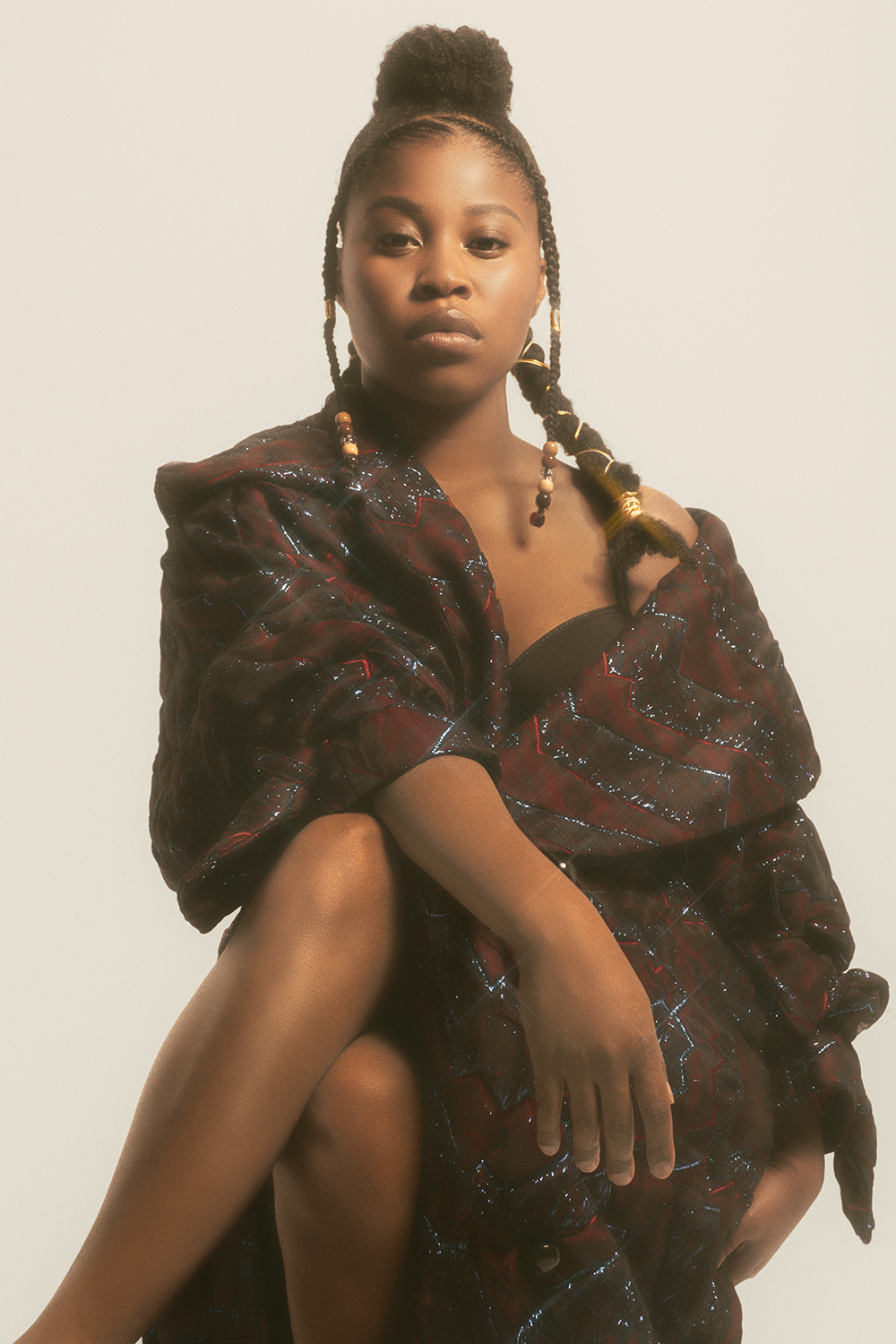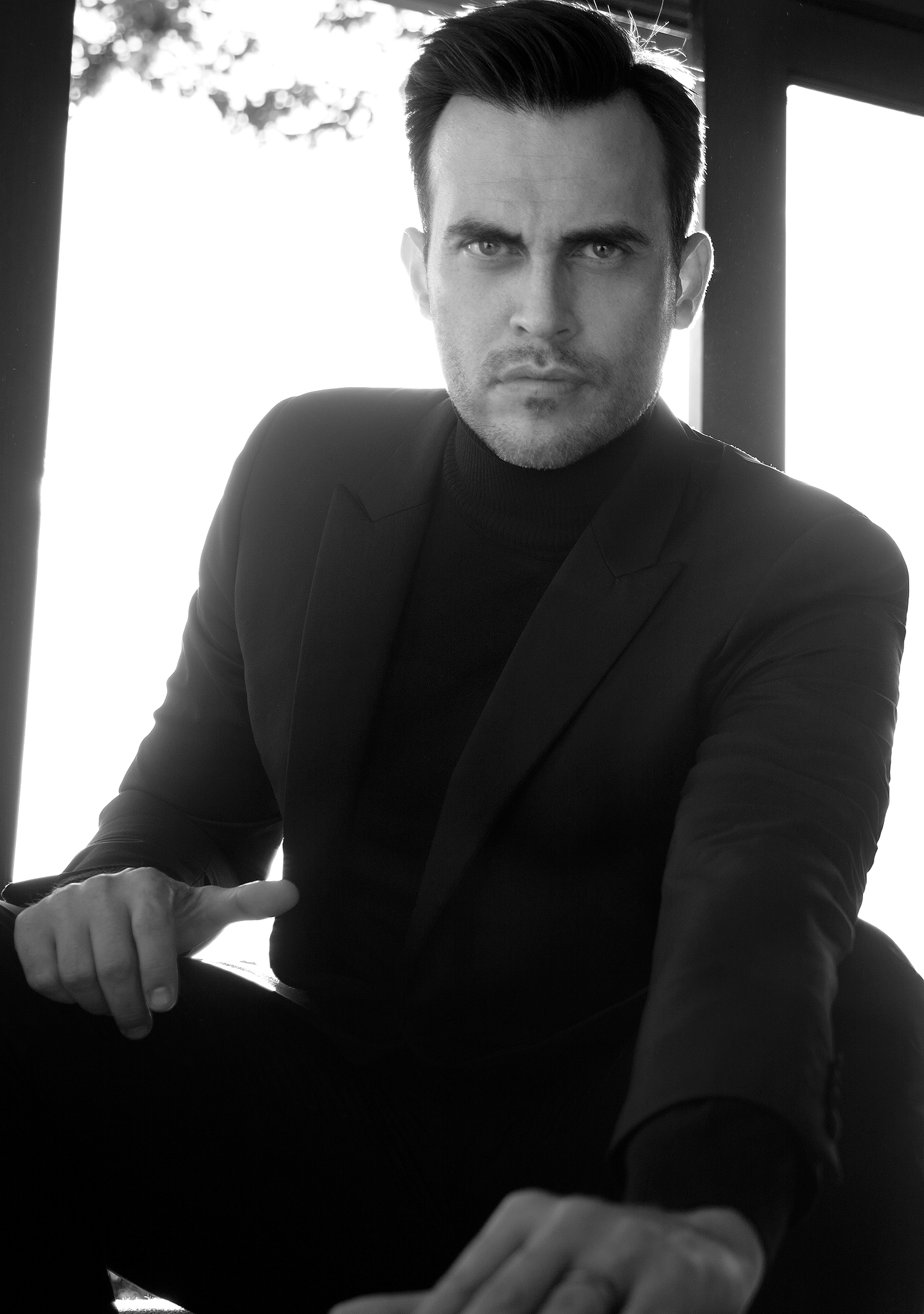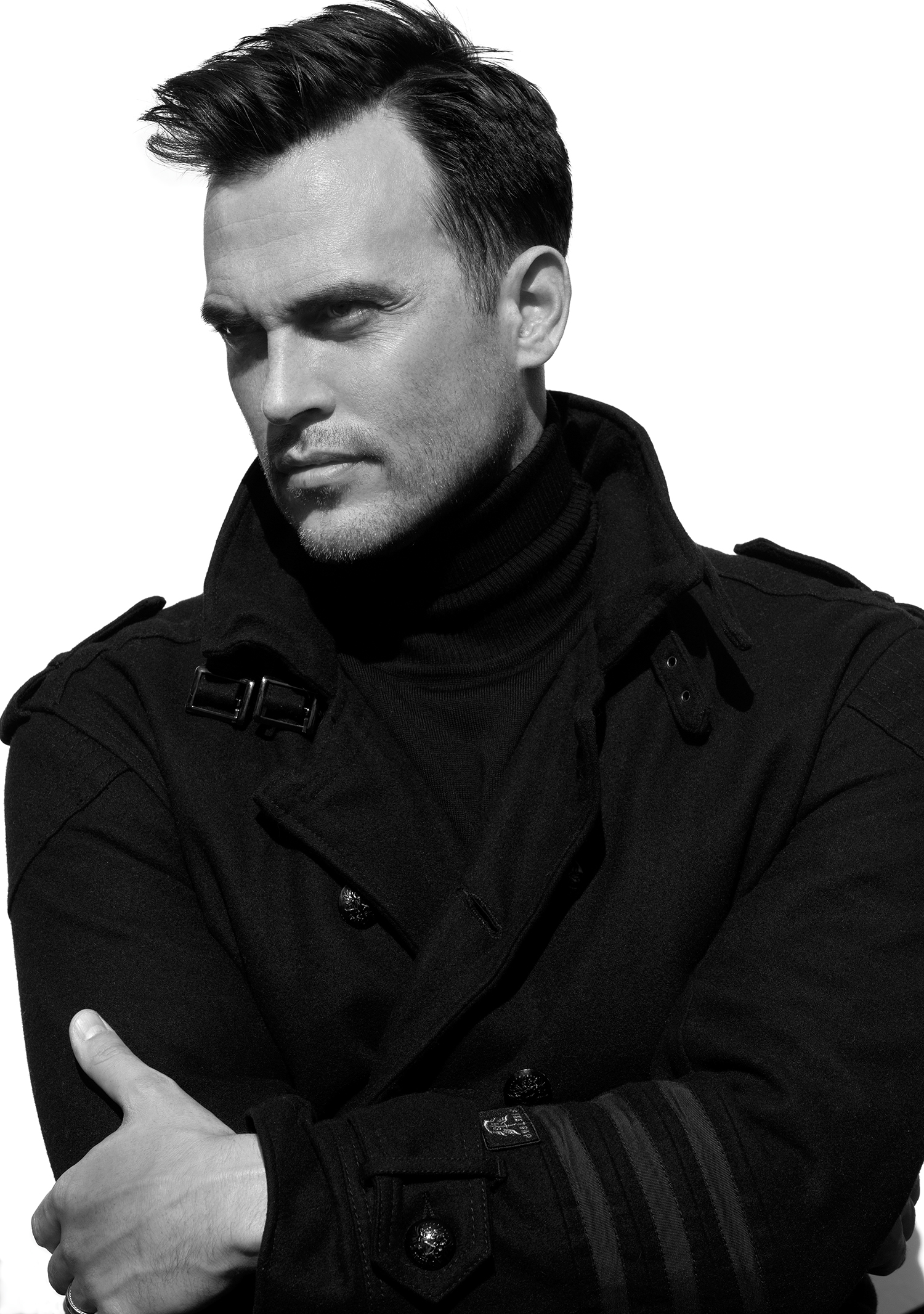LEE DANIELS
Star of His Own Empire: Behind the scenes, Lee Daniels is protagonist of his own story and reinventing the Great American Musical along the way.
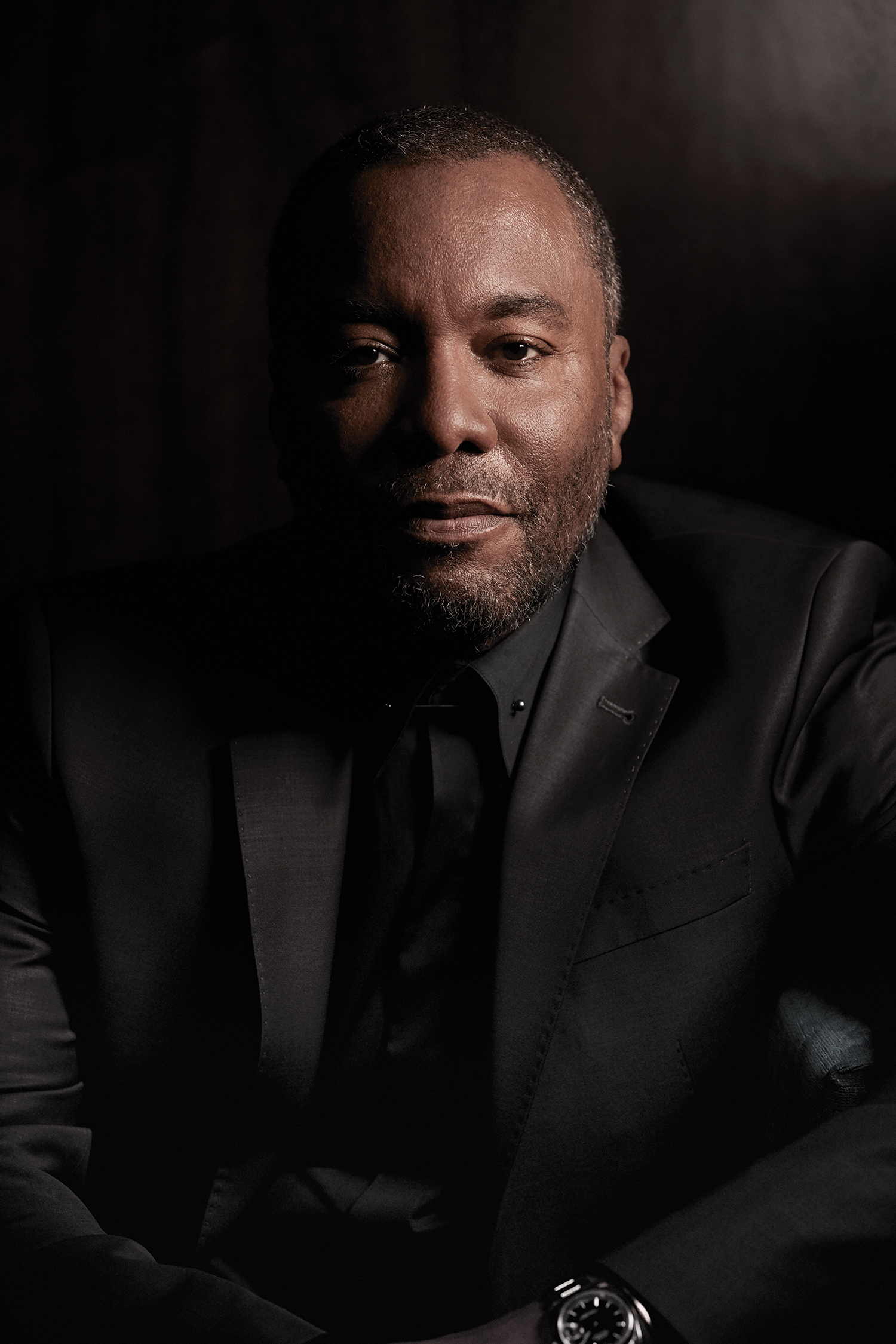 Photography by Diego Uchitel @ Jones Management | Styling by Rafael Linares @ Art Department | Interview by Alan Bindler
Photography by Diego Uchitel @ Jones Management | Styling by Rafael Linares @ Art Department | Interview by Alan Bindler
Suit and Shirt by Ron Tomson
West Side Story. Hair. Rent. Hamilton. Musicals have always reflected the times we live in. Passing on specific narratives as told by the people who have lived them is crucial to a society’s fabric, an entertaining amalgam of “real facts,” song and dance that often packs more truth than a public school history textbook. In this current Golden Age of Television, various portrayals of our society are being played out on screen to dizzying and oftentimes brutally honest effect. No one is synergizing these two factors better than Lee Daniels – the Academy Award nominated director and producer of Precious, Monster’s Ball, and The Paperboy, amongst others.
Empire, now in it’s fourth season and Star, in its second, are the hit television shows written and created by Daniels to confront the same topics splashed across newspaper headlines daily – sexual assault, racism, class divide – and are revolutionizing the industry with their interweaving of original music, fashion, and celebrity; using these as a backdrop to the gritty storylines that are holding a mirror up to the changing demographics of America.
Born in Philadelphia, his grandmother was a huge influence. In previous interviews, he has fondly described her as “a crooked politician“ and “gangster” who helped get the African- American community to vote at local levels in the 1960s during the Civil Rights movement. After the death of Daniels’ father, a policeman who beat him for being gay, his mother sent him to an upscale, white suburban high school, knowing he “couldn’t survive selling drugs.” A fund assembled by the Philadelphia police force had provided him with enough money for his first year and a half of college, and as an act of filial piety, Daniels found himself a girlfriend. The money ran out, and not wanting him to turn to the streets, she gave him seven dollars and a bus ticket to LA.
Living in the back of a church, he started working with the theatre program there to earn his keep. At the same time, he got a job as the receptionist for a nursing agency, a fact he attributed to using the “white voice” he learned in high school. Soon after, he went out on his own, founding his own agency and taking some of the nurses with him. At the height of the AIDS crisis, when other agencies were too scared to allow their nurses to work with HIV+ patients, Daniels’ became the first agency under AIDS Project LA. It made him a lot of money. That, united with a chance encounter with a connected Hollywood client, lead Daniels to sell his agency for “a couple of million.” His career in entertainment was born, starting with a PA job on the set of Prince’s Purple Rain and later moving up the ladder to Head of Minority Talent for Warner Bros.
Casting directing lead to managing, but when he got “tired of telling [African- American] actors that there weren’t any jobs for them,” Daniels transitioned into producing, hustling up the money to make Monster’s Ball, which garnered Halle Berry her history-making Best Actress Academy Award. Mining his own captivating life story, the goal in his work is to give the voiceless a voice, and to make viewers look at people that they normally wouldn’t.
“I’ll give you and feed you a political agenda, but with music, or with a sexy girl or a sexy boy or with some fashion. You will find yourself drawn and sucked into my world regardless of how you feel about me, through what you’re seeing and the audacity of it. Audacious is what it is that I try to be. Not shocking, but just showing shit to people that they don’t always get a chance to see, that other people are afraid to show…”, Daniels says. He is a truth teller, shit-talker, and skilled auteur, telling intimate stories that haven’t received such wide exposure until now.
Passionate as he is in bringing personal narratives to the screen, Daniels is also involved in several charities and nonprofit organizations. His work with the African American AIDS Institute (which is in danger of losing their funding) is a direct result of having lost most of his friends to the epidemic. “That I don’t have [HIV] is a miracle from God and I don’t know how I didn’t get it or haven’t gotten it… and I know that my work as an artist, my obligation isn’t just to my art and my craft but to my people,” he tells me candidly. This humility is also summoned when discussing his work with The Ghetto Film School, an award winning nonprofit that helps young filmmakers, which Daniels helped co-found with David O. Russell. They both still sit on the Board of Directors. “Because I didn’t go to film school, I didn’t have the luxury… I learned how to hold a camera by watching people as I produced films. To me this is not my gift. I don’t own it. I don’t own my art. My art is to pass on. My job in life is to pass it on to someone that will be far more talented than I. And so for me, the Ghetto Film School represents who it is that I am and what I have to do. It is my obligation to pass whatever gift that God has given me to others who haven’t been fortunate enough (to be able to) afford to go to film school.”
Speaking to him over the phone while he was in France for the Cannes Lions festival, I sense two things: one, that Mr. Daniels is extremely candid, as much so as his work; and two, that what Mr. Daniels doesn’t say is as important as what he does. He’s warm and spirited, with our conversation splitting off into tangents as numerous as his subplots. Here, we discuss embracing the grey areas of life, mortality, binge-watching… and a possible John Waters collaboration? With Lee Daniels, the element of surprise is as guaranteed as the controversy he brings to the screen.
There are times when I’m watching Star, specifically when they break into fantasy sequence musical numbers, that I really feel like I’m watching the 21st century incarnation of “The Great American Musical” … and yet this is about a very specific demographic. I pose this question in relation with a recent comment you made about wanting to be referred to as a “director” instead of a “Black director”, or a “creator” instead of a “Black creator”. Could you speak on how coming from a place of personal authenticity can translate to all people being able to relate, on a mass scale?
Yeah… it’s crazy… and this is what’s really frightening… It’s not the overt racists, that clearly one can see is racist, or clearly one can see is a gay basher… people with white masks, or people that don’t have a problem calling someone a nigger or a faggot… I’d rather see that, than those who truly don’t understand that they’re racist or homophobic. Those who really believe that they’re liberal and embracing of “the other,” and yet still take offense to my work. And ones that are in power that don’t see the problem. So for me, I’m the first to call someone out on that. That type there is the one that is scary, and I get in trouble with those people.
So in a way it’s almost as if your work is holding up a mirror to those that think they’re “woke…”
Yeah, because a lot of them ain’t woke!
You’re known for telling stories, and for giving a voice to controversial topics that haven’t been shared on the scale in which you’re sharing them. Do you ever feel you’re not giving enough time to one topic because there’s more emphasis placed on another?
Oh my God, I always feel like I’m rushing through a story, and I’m not giving enough time to a topic. There are so many subjects and atrocities to cover in America, and in our culture today. In film I can do it, in television I can’t. With Empire, it’s clearly about the kids in the empire. With Star, it’s about three girls struggling; but in the backdrop of that, we’re trying to tell stories that are politically important. That are important to what Americans need to see. Social topics are important. It’s hard to weave everything in.
How many other voices, particularly voices with power, and how many other opinions affect which stories you give priority to?
They sort of let me do my thing now. Which is the reason why I got into television from the very beginning. Danny Strong and I did Empire together and we had a very strong political agenda that was served. With Star I have a political agenda as well. When I am making the network uncomfortable, I know I’m doing my job. When Cookie descended from a cage in a gorilla suit from Central Park in the second season, beating her chest, and she rips off her outfit, and it’s Cookie dressed in Gucci couture and diamonds, saying that she felt like an animal in a cage because that’s how they’re treating us. The network freaked out! But that’s what I was feeling at the moment. I felt like my son, Taraji’s son, Terrence’s son, they were all Black men that were being targeted by the law at that time, so I wrote about it; I felt like we were all people in cages. But guess what? When she pulled off that gorilla suit, homegirl was in Gucci, head to toe, bejeweled in diamonds! I still laugh about Taraji screaming about getting into that monkey suit! But she did it because there’s no actor like her.
On that same subject, there’s a line in an episode of Star, the one with the Black Lives Matter protest, where Queen Latifah’s character says “You win by speaking the truth.” Your narrative, the specific narratives of the stories you tell are your truth. However, at a certain point that a creative achieves a certain level of fame – becomes mainstream, if you will – their narrative and their perspective sort of become “the narrative.” Are you worried about that at all with your work?
It’s terrifying because I didn’t realize that… you don’t know that you’re famous until you say something and it is completely taken out of context, and your kids are coming up to you and saying “why are they saying this ?”. And then there’s negative feedback from your own people. That’s really painful because you then realize you have an obligation to be politically correct in your agenda. And I’m not politically correct AT ALL. It can get me in trouble with my own people sometimes. And that’s inclusive of gays, I can get in trouble with the gay situation, I can get in trouble with the black situation, and you know… I’m sort of a loose cannon in that regard. It can get me sued. I’ve learned over the years to edit myself. And I don’t like editing myself. I’ve learned that some people just can’t handle too much of the truth. So I can only give them a little bit of the truth at a time. You’ve received criticism of topics you cover being “too left leaning” “too gay” etc… and these come from both sides of political and racial divides, different communities… Because I’m not going to sugarcoat a topic. I’m going to tell the truth from my perspective. Racism is not black or white. Homophobia is not black or white. There are grey areas that are there. Unless you take a specific stand on it that is pro or con, you get eggs thrown at you. So I’m very clear that there is a grey area. Because I embrace that grey area, I am criticized. I’ve learned to accept that, and it is what it is. There’s this one quote in which you reference your grandmother. You said you learned from her that “people aren’t good or bad, we all try to wake up in the morning to be the best person that we can be but we end up falling on our asses. No one is perfect. So my work has really been that grey area that we all are — that murky area that we all live in.
Is there anything else about that grey area that you can speak on?
Yeah (long pause). I know what I can talk about. I can talk about the grey area of parenting. I have two 21-year old kids, and oftentimes I feel like I have let them down as a parent. I’m constantly reminded that there’s no such thing as a great parent. You can only be the best parent that you can be. You see kids today, and this represents the millennial, and there’s a sense of entitlement that comes to these kids. Like “you owe me, give me, I’m here to take.” And there’s no work ethic there. I have wanted everything for my children that I did not have. And then you realize “Oh my god what have I done? I’ve created monsters,” not monsters but you know, like, entitled kids that are used to certain things. How will they be able to survive in the streets if I were to die tomorrow, you know, how will they survive? Not from a monetary standpoint, but how will they have the skillset to interact with people? So, now I find that I have to reteach things. My son didn’t know about racism at all until very recently. I had protected him from that by putting him in the schools that he went to. So now he sees it and he’s looking at me like, “why didn’t you talk to me about this?” Again, it goes into the grey area of life. I know that I’m not perfect but striving for perfection.
You’ve mentioned that before – how you have raised your own kids in this bubble where they had not known what it was like as far as what the real world had to bring; do you think that sort of affected how you tell stories, and if you were to make another Precious, now that your kids are older, how does that affect how you dive into these tough topics?
The most potent storytelling comes from a place of where I’m at right now in the moment. Empire came at a place where I was in that moment. It was important for me to tell that story because I needed to tell my family’s story at that moment. Star came at a time when I had to tell that story, and I’m still telling that story because I’m in that moment now. I’m not the guy that I was when I shot Precious. I don’t want to repeat myself, and I also have to tell a story that is important to me. It’s not going to resonate as true unless it’s in me right now. I’m in another part of my life where I’m realizing that mortality is real and that my next breath is not promised. So that area of storytelling is important to me because that’s how I’m feeling right now. Mortality, and telling stories about what have I contributed, what is my contribution, what have I laid out, what have I given back to the world in some way? That’s where I’m at right now.
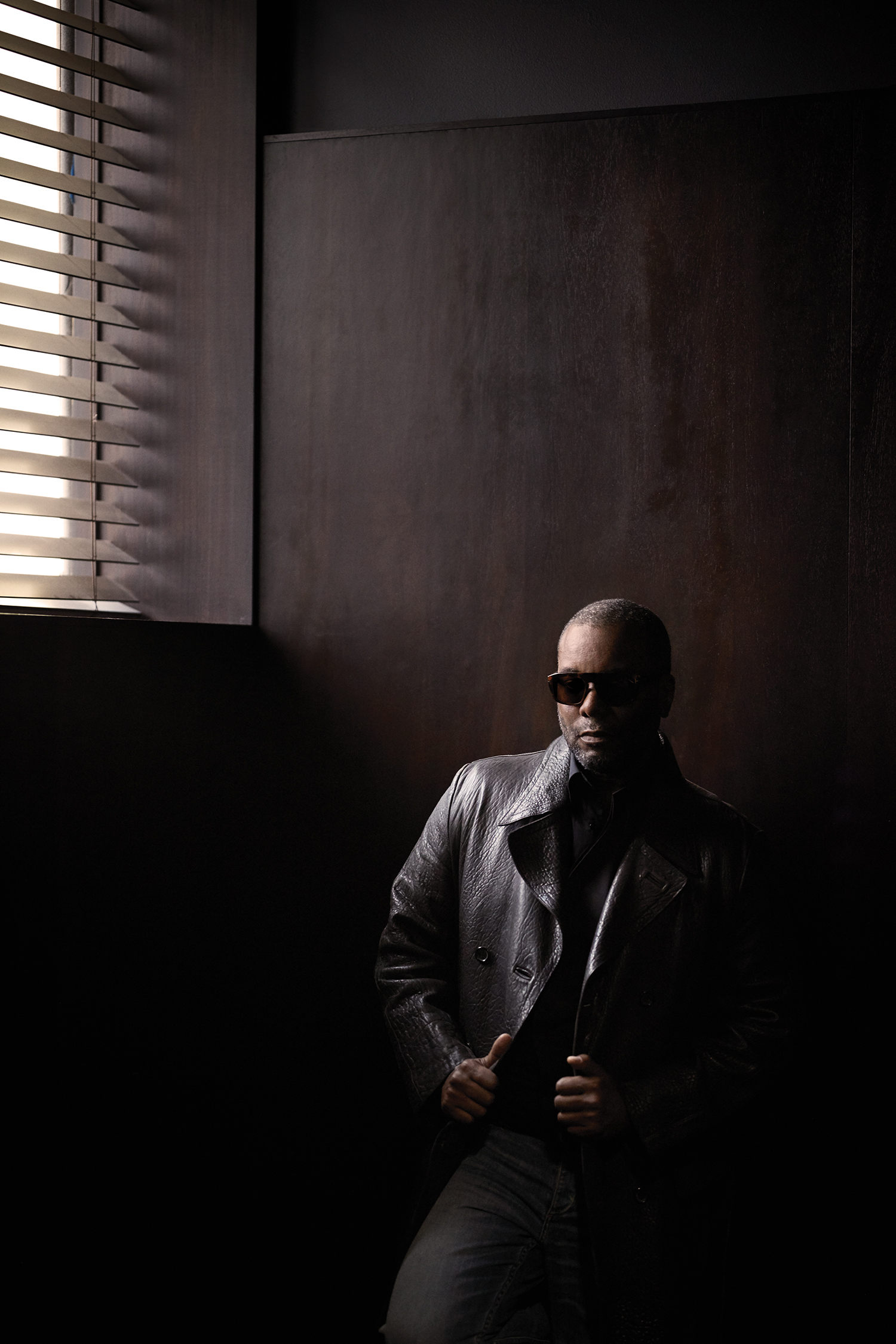 Trench Coat by Saint Laurent, Shirt and Jeans by Gucci, Sunglasses by Tom Ford
Trench Coat by Saint Laurent, Shirt and Jeans by Gucci, Sunglasses by Tom Ford
Speaking of mortality, you’re directing a new version of Terms of Endearment; you recently revealed that your remake of Terms of Endearment would deal with the intersectional issues of race and sexuality, specifically that Flap would contract HIV through homosexual sex and infect his wife. In response, critics and fans alike are saying things like “Wait, don’t mess with this classic” and “Far more people died of cancer than HIV!” Why do you think people have reacted this way?
People can say whatever they’d like to say. I say, BYE, haters! I have a story to tell. See y’all in the theaters! I don’t have time for people’s opinions. If I go with people’s opinions, then I’m not making Monster’s Ball, and I’m not making Precious, and I’m not making The Butler, and I’m not making Empire, and I’m not making Star, I’m doing what people want me to do. So, BYE people! I’ll see you in the theaters. And then they go see the movie and are like, (mockingly) “Oh, ok I get it.” …NEXT!
So basically you’re saying “Wait for it to come out, then come at me…”
Then come at me with all of your armor and spears… and you will anyway, so whatever.
In an interview with Elvis Duran, your protegé and an amazing actor, Gabourey Sidibe said what I think is going to be one of the most iconic quotes of her career. Speaking on the topic of self-confidence, she said that self-confidence is something that she has to remember to reapply to herself during the day, like lipstick. Could you speak to that a little bit? You’re a very confident guy…
I am not confident. It’s all a facade. It’s masked. As hard as I try to go for the truth in everything that I do, the only thing that’s untruthful about me, which is fascinating, is my confidence. My confidence is forced. And it’s exactly what Gabourey Sidibe says. That I have to constantly remind myself that I am worthy of being on this phone with you talking about ME. Because I don’t think that I… deep down somewhere there is an insecure boy that feels very much that he isn’t qualified to be on the phone. And I have no problems sharing that with the world, that the exterior masks a very scarred and insecure man, who has learned to love himself.
I want to follow up with you on a question that was raised during your SXSW keynote – I believe the question was something along the lines of how you feel the visual elements of storytelling are changing in this era of binge watching and mobile viewing platforms… at the time you didn’t have an answer. Have you thought about it since?
Well, let me tell you. I can talk about that now because I am now binge watching, and I’m always a little bit behind the eight ball because I’m always working. When I took a little break I started binge watching and now I’m obsessed!
(laughs) So tell me what you’re binge watching!
Well I haven’t finished it yet, but I’m obsessed with The Crown, like borderline crazy level. And right before that I binge watched The Handmaid’s Tale – obsessed with it! I can’t get enough of it! And right before that I binge watched The Night Of – oh my god! Just like obsessed with it, can’t get enough of it, and right after that I binge watched Feud. So I’m ready to talk about binge watching. I’ve never binge watched before until then.
Even your own work – Empire, Star…
I don’t see my work… I don’t binge watch my work, I cringe watch my work! how’s that? (Laughs)
But a lot of people are binge watching your work as it’s available on platforms like Hulu, so now that you are binge watching, could you speak on how that’s inspiring you to tell stories or how that may affect how you tell stories?
What I have learned now through binge watching is that these stories have to be ON. I can’t just drop the ball on a subject matter or topic that I’ve sort of grazed upon in one episode. So I’ve got to make sure that they land. Because I see the mistakes even with my favorite television shows that I binge watch and I would like to make sure that I don’t make the same ones. And I understand now the importance of binge watching, and I have a new appreciation of it.
Are there stories or products that you were holding on to and didn’t know quite what to do with and now that you are a part of this binge watching culture, you maybe see better opportunity to tell those stories?
Yeah, it’s hard though. Because you’re dealing with celebrities’ schedules that are on the show, along with production schedules, and then the notes from the studio. It’s a puzzle, it’s a jigsaw puzzle. It’s a miracle really, that any great television is made. I really don’t know how it’s done. Through a wing and a prayer! Because that’s how we did Star last year, and it will be just as difficult this year in making sure that we tell this story. Because we’re dealing with schedules. People’s schedules really screw it up! (laughs)
Other than your life stories and experiences, you’ve mentioned before that your influences vary widely. The first book you read, which had a huge influence on your entrée into the entertainment world, was Who’s Afraid of Virginia Woolf?. You’ve also said you and Mariah Carey call each other Cotton and Kitten based on an old John Waters movie [Pink Flamingos]…
(Laughs) Do you know John Waters’ films? I mean, how great is he? Astounding. I would love to see John Waters do something for Netflix or another streaming site, I mean what would that look like? He better figure it out! As a matter of fact I’m gonna call him when I get back from Cannes to make sure that his ass is behind the camera again because so many are influenced by his work. He is such an underrated trailblazer, at least in my eyes. He is everything! So yeah, Kitten and Cotton come to the rescue.
Do you think that we would ever get a Lee Daniels / John Waters collaboration?
I would kill for that! But here’s the thing. As we get older, we become more politically correct. I know I do, and I think John did and I think it’s just that a part of age is being old. I don’t know that I would have the courage to do Precious now, if that makes any sense at all. I know how it is out there. And youth… you know the naiveté that you have when you’re young and not afraid to be criticized, and then that level of fame that comes with that. I may hang up the phone with you now and say “Wow, this is almost like a therapy session, where I might say well maybe I will do something like Precious just to shock people. Because one expects you to go on and on, to bigger and better things. My first movie we made for two cents and it garnered Halle Berry the first Black woman to have an Academy Award, and that came from a place of utter fearlessness and not caring and not giving two F’s what anyone had to say about a subject matter that everyone in Hollywood passed on.
In 2015 you were on a drama showrunner roundtable panel where you said “I hate white people writing for Black people; it’s so offensive. So we go out and look specifically for African-American voices. Yes, it’s all about reverse racism!” and asked the other show creators if they had African-American people in their writer’s rooms. Another notable creator, Ava Duvernay, is known for selecting female directors for her show Queen Sugar. For this and the upcoming film A Wrinkle In Time, she even sent notice to the heads of each department not to submit a homogenous list of hires unless they could prove they had considered others. How do you feel about this approach to hiring crew and building a team? Could you speak more on this, especially with direct relation to the stories that you’re telling?
I can’t speak for Ms. Duvernay, I don’t know her. But I can speak for myself in that… I have to be frank with you. Again, it’s a grey area. Not to retract the comment, but if I could think about it again… there are people that aren’t of color that can write for people of color. But to a bigger picture so many people of color weren’t being hired to write for themselves. So, I can’t isolate to say that there aren’t those exceptions. That’s like saying that I can’t write for a white man, when I have; you know what I mean? A hundred percent. I think what a lot of people would say to that is that there’s enough white men writing for white men, so that’s why this is important; that we make sure we have enough people of color in the writing room… Yeah but I think that I make it a point to make sure that my world around me reflects the environment that I have grown up in and that I’m trying to articulate on the screen. So yeah, I believe strongly in hiring who’s right for the job. It’s tricky. I think I’m gonna be politically correct on that subject and shut up. Let me shut up on that comment. (laughing) How about that!
Going from one politically sensitive subject to another, last year was a huge year for entertainment depicting stories about people of color and featuring POC with Moonlight, Hamilton, etc. It was also the year our administration completely changed. Do you think these are related and how does one inform the other?
Yes. I think Trump is a reflection of who we are today and who we have become. Just as Obama was a reflection of where we were when he was in office. I think Trump is our karma, just as Obama was our karma.
Would you almost consider that as a backlash of sorts? You know, all of a sudden people of color have these voices… and now this happens. Do you think these stories that are being told and released on such a mass scale are causing this kind of backlash and uproar?
I think that we had our first Black president; and Empire was created, that changed the landscape of television. I think my mother needed a reality check. And I needed a reality check. America made sure that we got that reality check by putting Mr. Trump in office. So how does that now affect the narratives that you’re exposing or the stories that you’re telling? I have to respond accordingly now, don’t I? 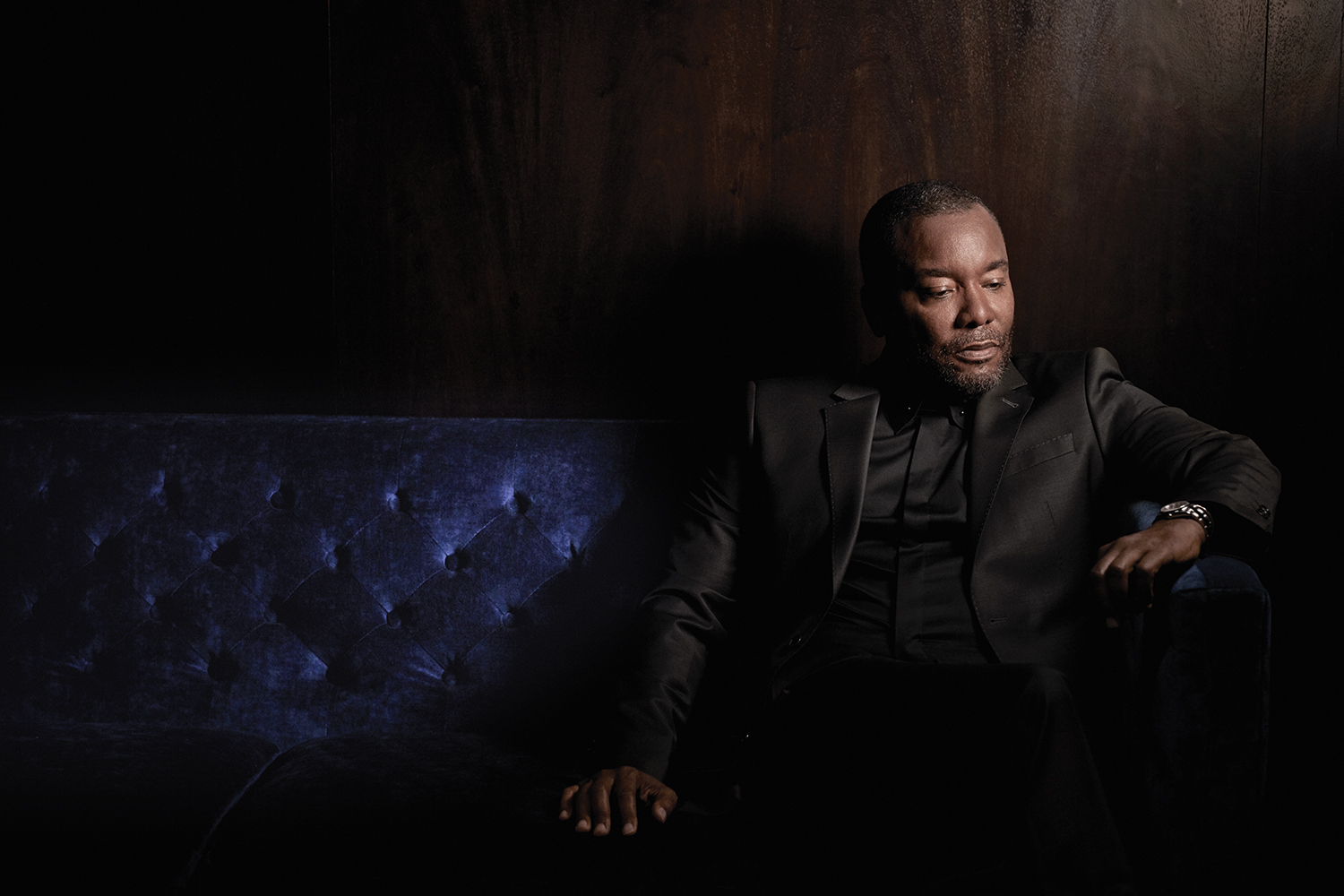 Suit and Shirt by Ron Tomson, Watch by Rolex
Suit and Shirt by Ron Tomson, Watch by Rolex
Grooming by Jhizet @ Forward Artists, Art Direction by Louis Liu, Editor Marc Sifuentes, Photographer’s 1st Assistant Jordan Jennings, 2nd Assistant: Luc Richard Elle, Production by XTheStudio, Special Thanks to Chantal Artur and Brooke Blumberg from Sunshine Sachs.
